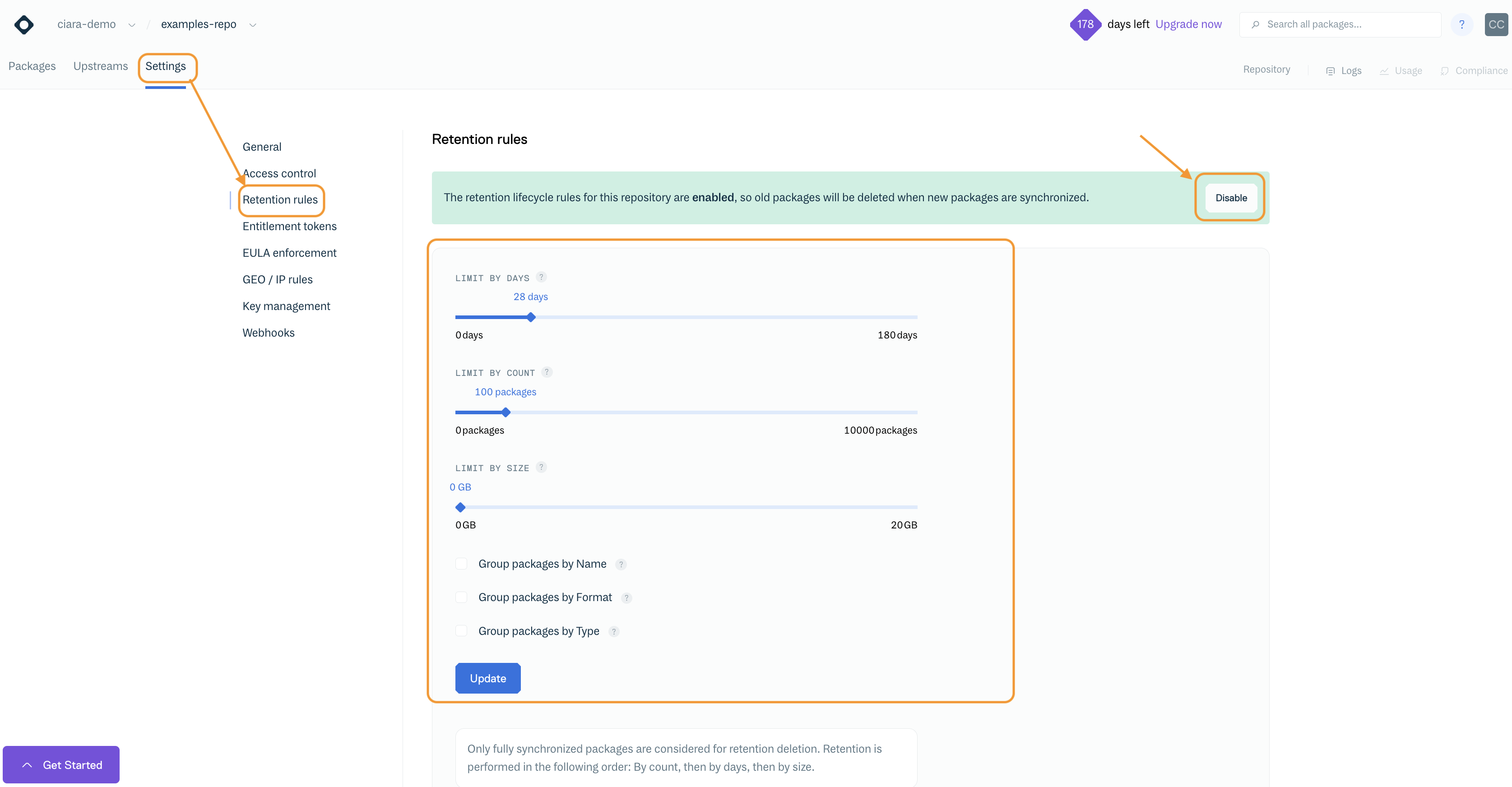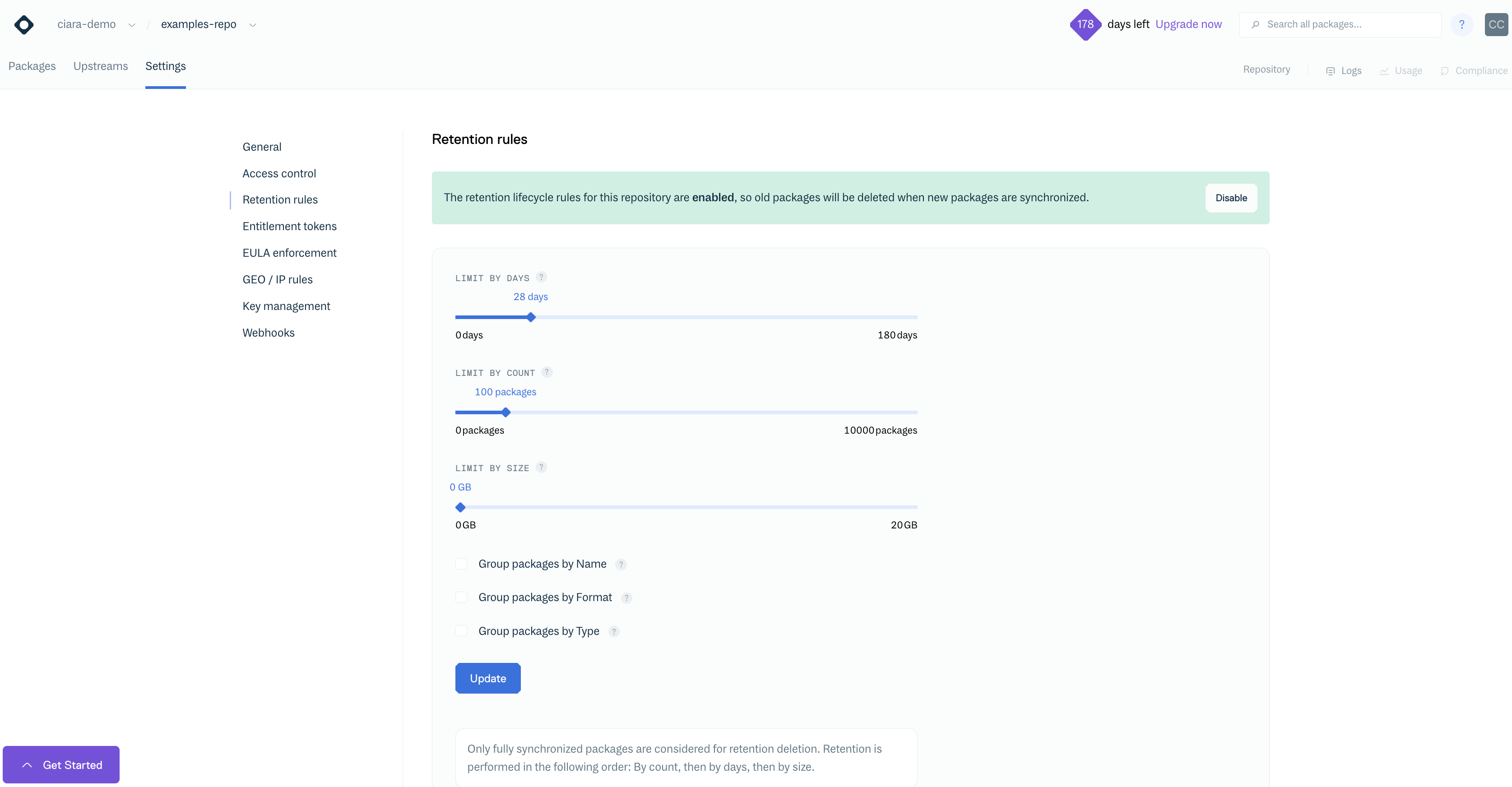Retention Rules
Cloudsmith retention rules automate artifact data management by deleting packages based on different criteria:
- the number of packages (count).
- the size of packages (bytes).
- the number of days (time).
- a search query to filter packages.
Each repository has one configurable retention rule. Hence, packages that do not meet the defined values will be deleted.
Retention rules can be configured via the web app, via the API, or via the Terraform provider.
Jump to the Configuration section to learn more about configuration fields.
Triggers
Retention rules are applied when a new package is synchronized.
They can also be triggered by resyncing the most recently uploaded package.
Note that one package could have 1000 days, and the 90 days retention still wouldn't activate.
Only after uploading a new package would the 1000 day package be deleted.
Cloudsmith determines which packages to delete by using a cutoff date.
The cutoff date is calculated by subtracting the retention days from the uploaded date of the resynced package.
For example: if the newest package was uploaded on June 10th and the retention period is 4 days, the cutoff date is June 6th. Any packages uploaded before June 6th are eligible for deletion.
Although a re-sync process will re-evaluate retention rules, it won't alter the upload date on a package.
Enabling Retention Rules
Retention Rules for a repository are disabled by default. Go to the Setting of the repository and, in the left menu, click in Retention Rules. Then, click the "Enable" button in the yellow banner.

Enabling Retention Rules
Alternatively, use the API to enable it with:
curl --request PATCH \
--url 'https://api.cloudsmith.io/v1/repos/WORKSPACE/REPOSITORY/retention?=' \
--header 'Authorization: Bearer API_TOKEN' \
--form retention_enabled=trueConfiguration parameters
| Name | API | Description |
|---|---|---|
| Enabled? | retention_enabled | Activates Retention Rules for the repository. |
| Limit by days | retention_days_limit | The number of days of packages to retain. Packages stored in the repository an amount of days bigger than retention_days_limit are selected for deletion. Set to zero to remove this criteria from the rules to apply. |
| Limit by count | retention_count_limit | The maximum number of packages to retain. Set to zero to remove this criteria from the rules to apply. |
| Limit by size | retention_size_limit | The maximum total size (in bytes) of packages to retain. Set to zero to remove this criteria from the rules to apply. |
| Group packages by Name | retention_group_by_name | If checked, retention will apply to groups of packages by name rather than all packages. For example, when retaining by a limit of 1 and packages PkgA 1.0, PkgB 1.0 and PkgB 1.1 are uploaded; only PkgB 1.0 is deleted because there are two (2) PkgBs and one (1) PkgA. |
| Group packages by Format | retention_group_by_format | If checked, retention will apply to packages by package formats rather than across all package formats. For example, when retaining by a limit of 1 and packages PythonPkg 1.0 and RubyPkg 1.0 are uploaded, no one is deleted because they are different formats. |
| Group packages by Type | retention_group_by_package_type | If checked, retention will apply to packages by package type (e.g. by binary, by source, etc.), rather than across all package types for one or more formats. For example, when retaining by a limit of 1 and packages DebPackage 1.0 and DebSourcePackage 1.0 are uploaded, no packages are deleted because they are different package types, binary and source respectively. |
| Query String | retention_package_query_string | A package search expression which, if provided, filters the packages to be deleted. For example, a search expression of name:foo will result in only packages called foo being deleted, or a search expression of tag:~latest will prevent any packages tagged latest from being deleted. Refer to the Cloudsmith documentation for package query syntax. |
From the UI, use the sliders to configure rule values, and finally click the green "Update" button to apply it.
Configuration parameters via API
Visit API reference and search by /repos/{owner}/{repo}/retention.
As a reference, use GET to consult an existing a retention rule or PATCH to update it.
Other considerations
When multiple parameters of a retention rule are enabled (it's value is set higher than zero) and a package meets none or any of the conditions (condition1 OR condition2 OR condition3) for those parameters, the package will be kept.
This means that, in order for a package to be deleted, it needs to meet all of the conditions (condition1 AND condition2 AND condition3) in the retention rule, and not be excluded by the retention_count_limit parameter when all packages to delete are ordered.
Limiting the number of packages to delete
The Limit by count option defines the number of packages to keep. For example, if we set its value to 4 and only a total of 3 packages meet the criteria, then 0 packages will be deleted. But if 5 packages meet the criteria, then 1 will be deleted and 4 will be keep in the repository.
This value applies per group. So, the maximum total number of packages to kept will always be the result of retention_count_limit multiplied by the number of groups.
Deletion order
Packages are deleted based on the date pushed, starting with the oldest and being newest packages the latest to be deleted until a total of TOTAL_PACKAGES - retention_count_limit packages have been deleted.
Groupings
If grouping is selected, it applies to the rules to each "grouping". Otherwise, it's across all packages within a repository.
For example, if “Group Packages by Name” is selected, retention will apply to groups of packages by name rather than all packages. For example, when retaining by a count limit of 1 and packages PkgA 1.0, PkgB 1.0 and PkgB 1.1 are uploaded; only PkgB 1.0 is deleted because there are two (2) PkgBs and one (1) PkgA. Or, If “Group Packages by Format” is selected, retention will apply to packages within package types rather than across all package formats. For example, when retaining by a limit of 1 and packages PythonPkg 1.0 and RubyPkg 1.0 are uploaded, no packages are deleted because they are different formats
Examples
Example 1
Delete packages older than 100 days.
To configure a retention rule in the UI that removes all packages older than 100 days, configure the next values:
- "Limit By Days" = 100
- "Limit By Count" = 0
- "Limit By Size" = 0.0B (disabled)

By disabling count and size, it means it only uses the package age to delete.
Example 2
Delete all packages that are more than 30 days old and do not have any tag.
curl --request PATCH \
--url https://api.cloudsmith.io/v1/repos/cloudsmith-test/acme-prod/retention/ \
--header "X-Api-Key: test-key" \
--header "accept: application/json" \
--header content-type: application/json" \
--data "{
"retention_enabled": true,
"retention_days_limit": 30,
"retention_package_query_string": "NOT tag:*"
}"Example 3
Delete all packages that are more than 60 days old and have less than 10 downloads.
curl --request PATCH \
--url https://api.cloudsmith.io/v1/repos/cloudsmith-test/acme-prod/retention/ \
--header "X-Api-Key: test-key" \
--header "accept: application/json" \
--header "content-type: application/json" \
--data "{
"retention_enabled": true,
"retention_days_limit": 60,
"retention_package_query_string": "downloads:<10"
}"Example 4
Kept only 5 packages per format (python, docker, helm, etc.), that are not older than 100 days, are not tagged with production, have been downloaded less than 10 times and are violating some policies.
curl --request PATCH \
--url 'https://api.cloudsmith.io/v1/repos/WORKSPACE/REPOSITORY/retention?=' \
--header 'Authorization: Bearer API_TOKEN' \
--header "accept: application/json" \
--header content-type: application/json" \
--DATA "{
"retention_enabled": true,
"retention_days_limit": 100,
"retention_count_limit": 5,
"retention_size_limit": 0,
"retention_group_by_name": false,
"retention_group_by_format": true,
"retention_group_by_package_type": false,
"retention_package_query_string": "tag:~production AND downloads >= 10 AND policy_violated"
}"Updated 4 months ago
